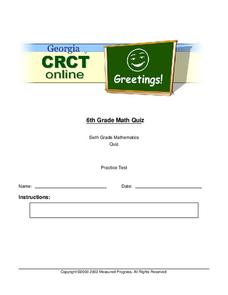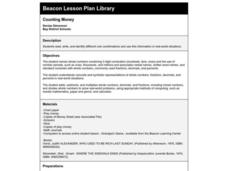Curated OER
Exponents
In this exponents worksheet, 8th graders solve 16 various types of problems from writing patterns in exponential form to word problems that determine how much greater mass is and how much money was received. They simplify and rewrite...
Curated OER
Alien Exchange
Oozam is a fictional planet whose money value is determined by shapes. Students should enjoy practicing their money counting skills with this fantastic learning exercise.
Curated OER
Sixth Grade Mathematics Quiz
In this math worksheet, 6th graders complete multiple choice questions about variables, money, weight, and more. Students complete 15 questions.
Curated OER
Breaking News English: Coca-Cola
In this Coca-Cola worksheet, students read the article, answer true and false questions, complete synonym matching, complete phrase matching, complete a gap fill, answer short answer questions, answer discussion questions, write, and...
Curated OER
What is Money? Learn the Role of Money in a Free Market System
Middle schoolers view a seashell and listen as the teacher explains that these were sometimes used as money. They listen as the teacher lectures on medium of exchange, barter, and commodity. Students determine the number of chickens it...
Curated OER
Counting Money
Students read, write, and identify different coin combinations and use this information in real-world situations.
Curated OER
Money Matters
In this systems of equations learning exercise, students write and solve a system of equations to find the number of coins in the money problem. The steps to the solution are included on the page.
Los Angeles County Office of Education
Assessment for the California Mathematics Standards Grade 3
Assess scholars' knowledge with a 22-page assessment that covers place value, patterns, probability, estimation, measurement, geometric figures; and their ability to add, subtract, multiply and divide proficiently.
Los Angeles County Office of Education
Assessment for the California Mathematics Standards Grade 1
Here is an assessment designed to test mathematicians' knowledge of writing numbers, comparing numbers, skip counting, solving addition and subtraction problems; along with measuring objects, telling time, identifying shapes, reading...
Illustrative Mathematics
What is 23 ÷ 5?
Twenty-three divided by five can have a different value depending on the unit of measurement being asked. Learners problem solve 23 divided by 5 in a series of five word problems.
EngageNY
End-of-Module Assessment Task: Grade 6 Math Module 3
The last installment of a 21-part module is an end-of-module assessment. Individuals show their understanding of positive and negative numbers on the number line, absolute value, and the coordinate plane in a variety of contexts.
Curriculum Corner
Splashes of Spring Math Centers
Spring into math practice with a set of resources that taps into a variety of math practice. Skills include matching expressions to their definitions, a place value sorting activity, three multiplication and division games, several...
PBL Pathways
Medical Insurance
Design a plan for finding the best health insurance for your money. Learners compare two health plans by writing and graphing piecewise functions representing the plan rules. Using Excel software, they create a technical report...
National Constitution Center
Writing Rights: The Bill of Rights
Where did the cherished ideals enshrined in the Bill of Rights originate? While history gives the Founding Fathers much of the credit, laws in colonial America influenced the Bill of Rights. An interactive web-based activity allows...
Curated OER
ADULT ESOL LESSON PLAN--Concepts of Time and Money.
Students identify/recognize types of currency in the United States. In addition, they view the symbols associated with money and practice reading prices (dollar/cent signs, decimal point, etc.).
Curated OER
Count On It!
Students practice counting money. In this consumer math lesson, students identify the various U.S. coins and group them in various ways to equal a dollar. Students will use the money they collected for a donation towards a non-profit...
Curated OER
Money Madness
Second graders review coins and their values. In this coin recognition lesson, 2nd graders review the coin values as they read 'Smart' by Shel Silverstein. Students use class computer demonstrations to identify the coin's names, worth,...
Curated OER
Money
Young scholars use play coins to solve problems. They imagine that someone handed them two coins. One is a quater and one is a dime. Students are asked by feeling the shapes of the coins, how could they tell which one was the quater?...
Curated OER
Place Values-Adding
Students find place value. In this place value lesson, students are shown examples on the board by their teacher. A ten-problem worksheet is included. Problems involve only the hundreds and ten thousands place.
Curated OER
Combining Coins
Students explore counting coins. In this money counting lesson, students are given an assigned number of coins and calculate the least amount of coins that could be used to equal the same value. Students participate in guided practice...
Curated OER
Coins
In this money worksheet, 2nd graders count and write the total value of the coins show in each of 3 boxes. They count coins which include pennies, nickels, and pennies.
Howard County Schools
To Babysit or Not to Babysit?
Would you work for a penny today? Use this activity to highlight the pattern of increase in an exponential function. Scholars compare two options of being paid: one linear and one exponential. Depending on the number of days worked, they...
EngageNY
Why Do Banks Pay YOU to Provide Their Services?
How does a bank make money? That is the question at the based of a lesson plan that explores the methods banks use to calculate interest. Groups compare the linear simple interest pattern with the exponential compound interest pattern.
Virginia Department of Education
Road Trip
Help plan a road trip with linear equations. Scholars consider two different rental car companies and write equations representing the cost for each company. They graph the system of equations to determine the conditions under which each...

























